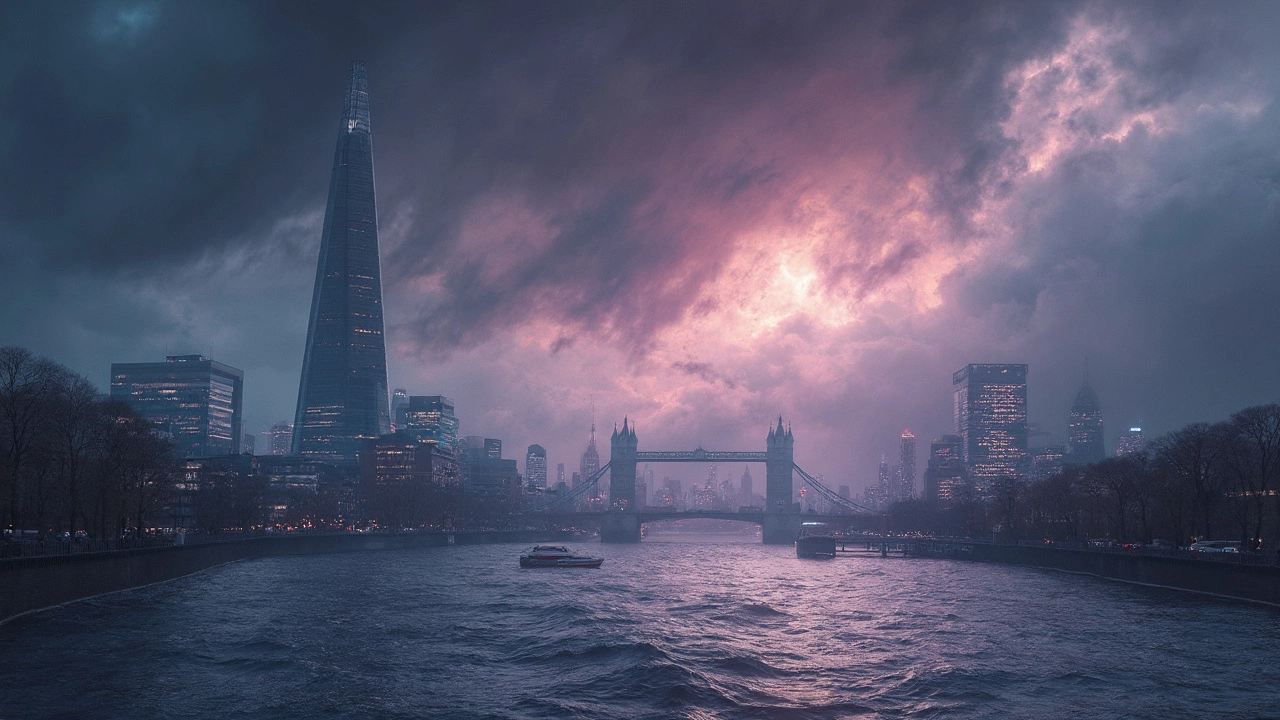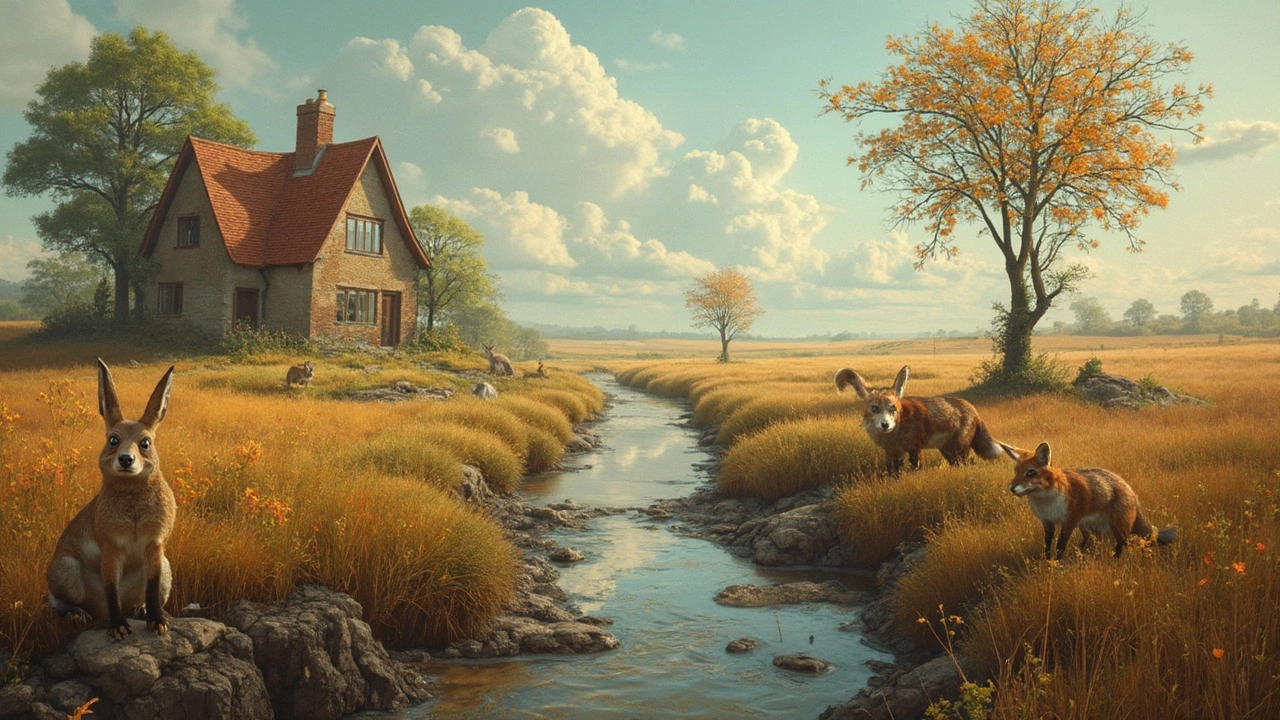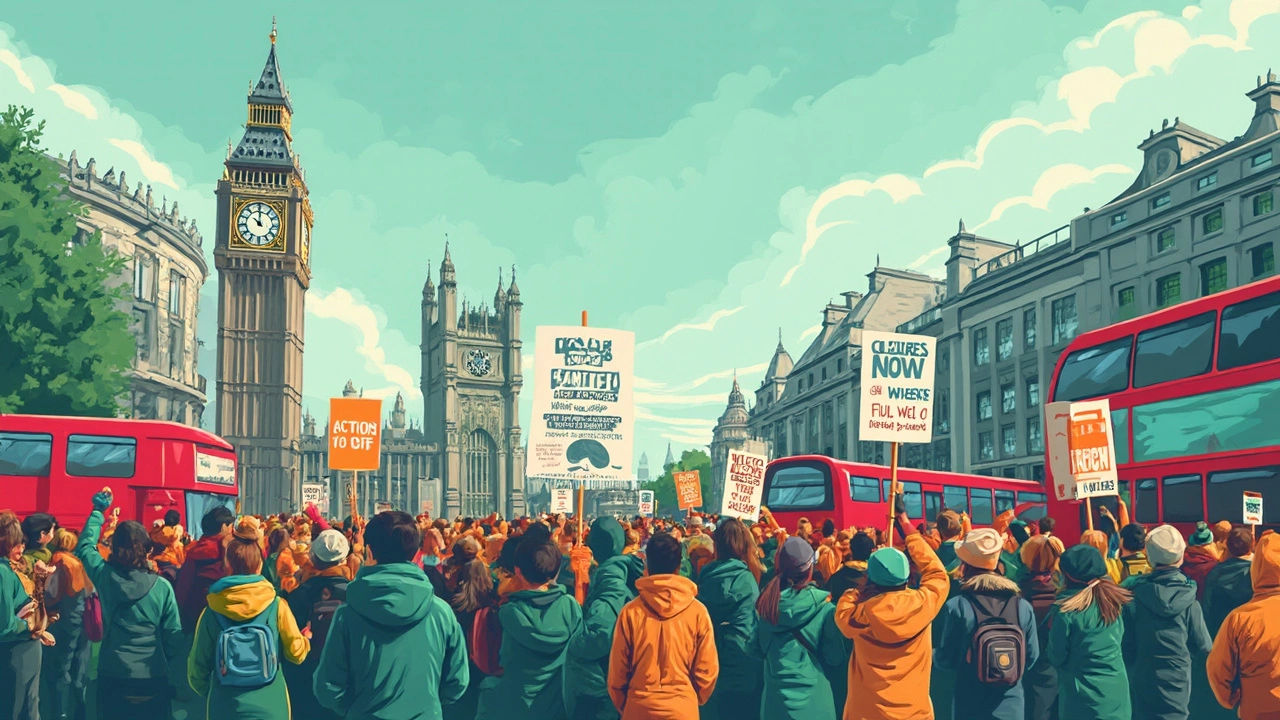Climate Change: The Most Immediate Threat to Life on Earth
 Mar, 15 2025
Mar, 15 2025
So, what exactly is the biggest threat to life as we know it? Spoiler alert: it's climate change. It's not some distant issue we can punt down the road; it's staring us right in the face. With global temperatures climbing and wild weather events becoming more common, it’s clear we need to get serious about this.
Let's break it down. When we say climate change, we’re mostly talking about the warming of our planet due to greenhouse gases like carbon dioxide and methane. These gases trap heat in the atmosphere, making the Earth warmer than it used to be. It's like adding an extra blanket to your bed—a little too toasty, right?
Now, you might be wondering, what's the big deal with a few degrees here and there? Well, those small shifts lead to big impacts. We're talking rising sea levels, more intense storms, and disruptions to our food and water supplies. Not exactly a future anyone wants to sign up for.
- Understanding Climate Change
- Immediate Consequences
- Impact on Ecosystems
- Steps to Mitigation
- The Role of Individuals and Communities
Understanding Climate Change
Climate change isn't just this abstract thing you hear scientists talk about—it's a real and urgent issue. At its core, climate change refers to long-term changes in temperature and weather patterns. A big chunk of this change is due to human activities like burning fossil fuels and deforestation.
What's Causing It?
When we burn coal, oil, or gas for energy, we release carbon dioxide (CO2) and other greenhouse gases into the air. These gases act like a heat-trapping blanket around the Earth. Sounds cozy, right? But not so much. This leads to global warming, which throws everything out of whack, from ocean currents to weather systems.
The Greenhouse Effect
The greenhouse effect is a natural process that makes life on Earth possible. Without it, our planet would be way too cold. But by cranking up the level of greenhouse gases, we've ended up amplifying this effect to dangerous levels. The extra warmth is melting ice caps, making seas rise, and generally messing with natural habitats.
Current Facts and Figures
Want some numbers? Here you go: According to NASA, Earth's average surface temperature has risen about 1.2°C since the late 19th century. Most of this warming happened in the last 40 years, with 2016 and 2020 tied for the warmest years on record. These might sound like small changes, but they’re having huge impacts.
| Year | Global Temperature Anomaly (°C) |
|---|---|
| 2016 | +1.02 |
| 2020 | +1.02 |
| 2023 | +1.07 (estimated) |
Knowing these facts is the first step, but what's next? We have to rethink our energy habits, look into renewable energy sources, and just be way more eco-conscious. Because doing nothing isn't an option.
Immediate Consequences
Alright, let’s talk about the repercussions of climate change that are knocking on our door. First off, sea levels are rising at a rate we can’t ignore. When ice sheets melt, they add more water to our oceans, which means coastal areas are getting flooded more often. Some scientists predict that by 2050, many low-lying areas could be partially submerged.
Extreme Weather Events
We’ve all noticed how the weather seems more unpredictable these days, right? Records show that hurricanes, droughts, and heatwaves are increasing in frequency and intensity. It’s like Mother Nature on a caffeine buzz, and it’s seriously impacting our agriculture, infrastructure, and economy.
Impact on Biodiversity
Our ecosystems are in a bind, too. Many animals and plants can’t adapt fast enough to the global warming, leading to a disturbing rise in extinction rates. Coral reefs are bleaching, polar bears are losing their icy homes, and migratory birds are getting confused. It's a domino effect that threatens the very fabric of life.
Economic Challenges
These environmental changes aren't just bad news for nature lovers. They hit us where it hurts: our wallets. Disasters mean more money spent on rebuilding, and losses in crops affect food prices worldwide. This cycle stresses economies, especially in vulnerable regions that lack resources to cope.
Take a look at this data showing the rise in economic losses due to climate-related disasters:
| Year | Losses (in billion USD) |
|---|---|
| 2010 | 20 |
| 2015 | 45 |
| 2020 | 85 |
It’s clear that immediate steps are crucial to slow down these effects. If this doesn't sound an alarm, I don't know what will. What we do next could define our planet's future, so it's time to roll up our sleeves and get cracking.

Impact on Ecosystems
Climate change isn't just about the weather getting weirder—it’s about ecosystems being thrown out of whack. When you mess with the climate, you're messing with everything depending on it, and that's, well, pretty much everything.
Let's start with the oceans. These majestic bodies of water are soaking up a lot of that extra heat, causing sea temperatures to rise. Warmer oceans mean huge changes for marine life. Coral reefs, for example, are super sensitive to temperature shifts. Ever heard of coral bleaching? It's when corals expel the algae living in their tissues, turning them white and, if it goes on too long, eventually leading to coral death. Not good.
On land, we're seeing wildlife struggling to keep up with the pace of change. Some animals are migrating earlier or moving to new areas as their habitats shift. Others can't adapt fast enough and face the threat of extinction. It's a brutal game of survival that most species just aren't equipped for.
Impact on Plants and Agriculture
And it's not just animals feeling the heat. Plants are too. Changing climate zones mean plants have to adjust or literally move, which is, you know, hard when you're rooted in the ground. The really tricky part? This affects agriculture big time.
- Crops that thrived in cooler climates might start flopping due to the heat.
- Water sources are getting unpredictable, with some areas drying up and others flooding.
- This messes with food production and can lead to shortages and increased costs.
One interesting stat? A study from 2023 showed that if we don't cut back on emissions soon, up to 30% of agricultural land could become unsuitable for traditional farming by 2050. That’s a scary prospect as we’re trying to feed more and more people.
Ecosystem Interdependence
The real kicker is how interdependent ecosystems are. Knock one part out of balance, and you might trigger a domino effect. For example, losing a certain species of fish affects the animals that rely on it for food, and that can keep rippling out.
To wrap it up, the impact of climate change on ecosystems is massive and complex. The faster we get a handle on our carbon emissions, the better chance we have of keeping our planet's delicate balance in check.
Steps to Mitigation
Alright, so we know climate change is a huge issue, but what can we actually do about it? The good news is that there are several actionable steps we can take to address climate change and reduce its impacts. Let's dive into some effective strategies that can make a real difference.
Reduce Greenhouse Gas Emissions
The first big step is cutting down on those pesky greenhouse gases. This means moving away from fossil fuels like coal and oil and embracing renewable energy sources such as wind, solar, and hydroelectric power. By switching to cleaner energy, we can significantly cut back on carbon emissions.
Increase Energy Efficiency
Think about the ways we use energy every day, from lighting to heating and cooling. Using energy-efficient appliances, better insulation, and smarter building designs can help reduce our overall energy consumption. Small changes in energy usage can lead to big reductions in emissions.
Protect and Restore Ecosystems
Our forests, wetlands, and other ecosystems are natural carbon sinks—they soak up carbon dioxide from the atmosphere. Protecting these areas and restoring damaged ecosystems can boost their ability to absorb carbon. Planting more trees and supporting biodiversity are simple yet effective actions.
Promote Sustainable Agriculture
Agriculture is a major source of greenhouse gas emissions, but sustainable practices can help. Using techniques like crop rotation, reducing fertilizer use, and focusing on local food production can lower agriculture's carbon footprint. Plus, it's healthier for the soil and our diets.
Encourage Policy Changes
Finally, we need the support of governments and businesses to drive real change. Advocating for stronger environmental policies, supporting carbon taxes, and incentivizing green technologies can help bring about systemic transformations. It's about creating a world that prioritizes the planet.
Numbers Speak Louder
Consider this: transitioning to 100% renewable energy could reduce carbon emissions by up to 80% by 2050. Imagine the impact. We’re talking huge benefits for both the environment and the economy.

The Role of Individuals and Communities
You might think, "I'm just one person—can I really make a difference in tackling climate change?" The answer is a big yes! It's like that saying, 'small things, big impact.' When individuals and communities unite in their efforts, the results can be breathtaking.
Individual Actions
First off, let's talk about individual actions. Everyday habits like reducing energy consumption by turning off lights and using energy-efficient appliances can make a significant impact. Switching to public transport, biking, or carpooling instead of driving solo also plays a huge role in cutting down those nasty emissions.
Buying local products and reducing waste by recycling and composting might seem minor, but they tackle the problem at its roots. Even choosing a plant-based meal once a week can reduce the carbon footprint, saving resources and energy usually spent on meat production.
Community Efforts
Communities can amplify these efforts. Ever heard of community gardening? These not only beautify neighborhoods but also strengthen local food systems, cutting transit emissions.
Renewable energy co-ops have sprung up in several places. These community-led initiatives promote the use and installation of solar or wind power, helping neighbors reduce reliance on fossil fuels.
"Never doubt that a small group of thoughtful, committed citizens can change the world; indeed, it's the only thing that ever has." – Margaret Mead
Influence and Education
Beyond physical actions, raising our voices matters. Approaching local leaders about sustainability policies, attending town hall meetings, or starting informational groups can drive the push for bigger changes.
- Organize workshops on reducing carbon footprints.
- Create 'how-to' guides for starting community solar projects.
- Host talks on local climate initiatives to inspire action.
Let's not underestimate education—it’s key! More informed communities often take more decisive actions. Introducing climate education in schools prepares future generations to be conscious of their environmental impact.
So, while it might feel like we're just a drop in the ocean, together, we have the power to create waves of change!
